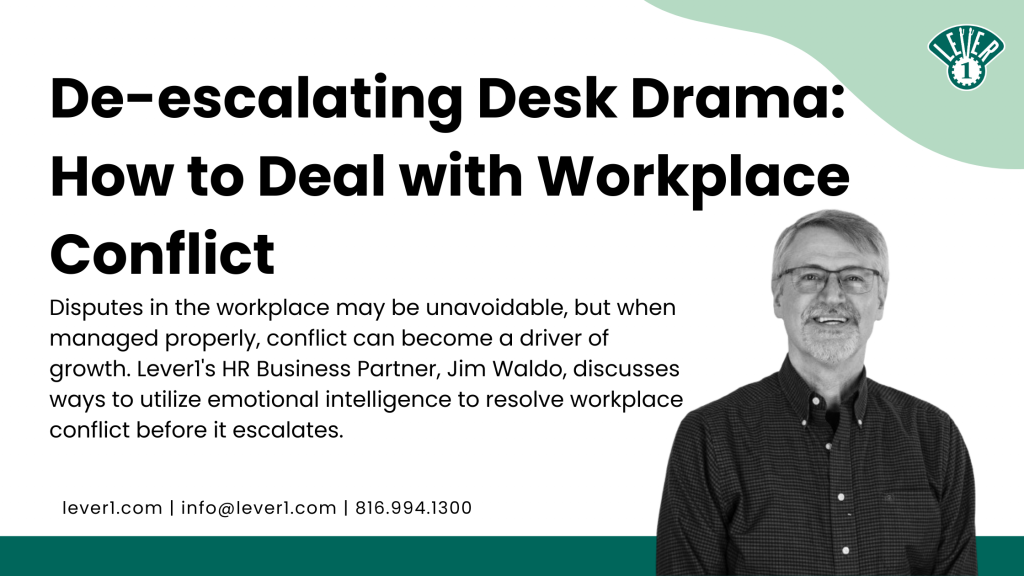
As the great cast of High School Musical once said, “we’re all in this together” and that rings true when it comes to conflict in the workplace. Conflict in the workplace is an inevitable part of any organization and when individuals with diverse perspectives, personalities, and goals collaborate, disagreements are bound to arise. While conflict can be disruptive, it can also serve as a catalyst for growth, innovation, and improved communication—if managed effectively. Understanding the nature of workplace conflict and utilizing tools like emotional intelligence, accountability, and expert HR support can turn potential chaos into constructive outcomes.
Understanding Workplace Conflict
Workplace conflict can stem from various sources, such as differences in what temperature the office should be set at or how a project should be managed, but ultimately it often comes down to differences in values, communication styles or work ethics.
It can manifest as a simple disagreement or escalate into a more serious dispute that disrupts team dynamics and productivity. Left unchecked, conflict can lead to low morale, decreased employee engagement, poor productivity and even higher turnover rates. Therefore, it’s essential for organizations to address conflicts proactively and equip employees with the right tools to manage them.
The Role of Emotional Intelligence
Emotional intelligence (EI) is a critical skill in managing workplace conflict. EI involves the ability to recognize, understand, and manage one’s own emotions, as well as the emotions of others. Employees with high emotional intelligence can navigate conflicts more effectively by remaining calm, empathetic, and solution-focused. You don’t have to be born with EI. It is a skill that can be taught to anyone who is willing to learn.
For instance, when a conflict arises, an emotionally intelligent employee might first assess their own emotional state to avoid reacting impulsively. They can then engage in active listening, seeking to understand the other person’s perspective without judgment. This approach fosters an environment of mutual respect, making it easier to find common ground and resolve conflicts.
The Power of Accountability
Accountability is another vital tool for conflict management. When employees take ownership of their actions and contributions to a conflict, it creates a foundation for honest and constructive dialogue. Accountability encourages individuals to reflect on their behavior, acknowledge any mistakes, and commit to making positive changes.
In practice, promoting accountability might involve setting clear expectations for behavior, establishing transparent communication channels, and implementing regular feedback loops. For example, if a team member consistently misses deadlines, a manager might hold a one-on-one meeting to discuss the impact of this behavior on the team and collaboratively develop a plan to improve performance. This proactive approach not only addresses the immediate issue but also empowers the employee to take responsibility for their actions moving forward.
Lever1: Expert HR Support
While emotional intelligence and accountability are crucial, sometimes conflicts require intervention from HR experts. Lever1 offers comprehensive support to businesses in managing workplace conflicts. Our expertise in policy review, manager training, and corrective action ensures that conflicts are handled professionally and in compliance with legal standards.
Our approach to conflict management includes conducting thorough assessments to understand the root causes of disputes, offering tailored training sessions to equip managers with conflict resolution skills, and providing ongoing support to ensure that conflicts are resolved effectively and sustainably. By partnering with Lever1’s team of HR experts, organizations can navigate complex conflicts with confidence.
Conclusion
Conflict in the workplace doesn’t have to be destructive. By leveraging tools like emotional intelligence, accountability, and expert HR support, businesses can transform conflict into opportunities for growth and improvement. Whether it’s through developing self-awareness, fostering a culture of accountability, or seeking professional guidance, organizations that prioritize effective conflict management are better positioned to maintain a positive and productive work environment.
Jim Waldo, MBA | HR Business Partner
Jim has over 25 years of HR management experience, primarily in 24/7 manufacturing environments. Jim has worked in union organized environments negotiation labor agreements as well as non-union workplaces with an emphasis on remaining union free. Jim’s experience has always emphasized collaboration and partnership concentrating on strong labor and employee relations. Jim’s HR background is very diverse with experience in everything from onboarding and orientation to strategic leadership development. In addition to all of the components of managing an HR department, Jim brings many years of OSHA safety program development and administration.

